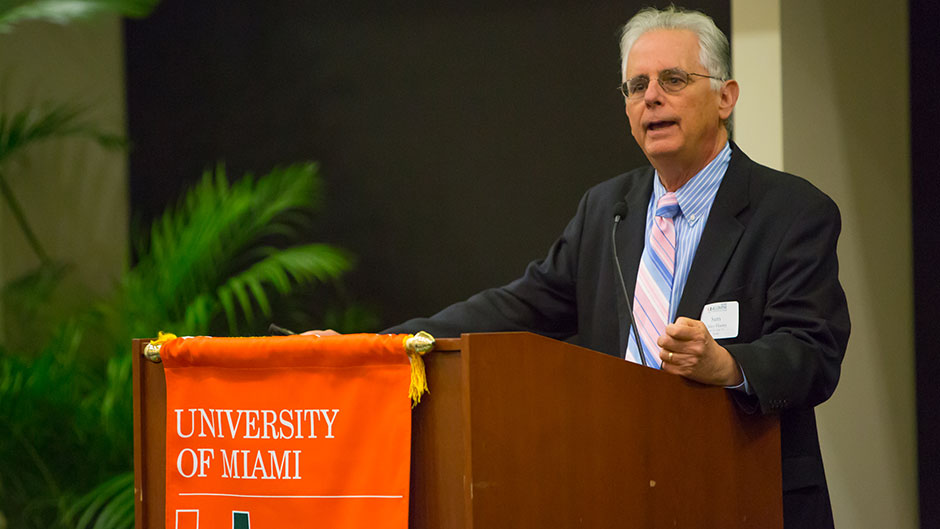When Sam Daley-Harris was in his senior year at the University of Miami, Robert F. Kennedy was assassinated. The event so shook him that the musician questioned who he was and what his purpose in life would be for however long he had on this earth.
Forty-five years later, Daley-Harris, B.M. ’69, M.M. ’75, was back at his alma mater to share his journey from philosophical musician to global activist during the 2015 Distinguished Alumni Lecture held at the Robert and Judi Prokop Newman Alumni Center.
"Making the Difference You’ve Always Dreamed of Making" was the title of his talk, and by the end it was clear Daley-Harris has done just that and then some.
The Miami native was a percussionist with the Miami Philharmonic Orchestra and a high school music teacher when he founded the anti-poverty lobbying group RESULTS and its sister organization RESULTS Educational Fund in 1980. His achievements in empowering millions of everyday citizens to demand action from Congress in the fight against poverty and hunger have earned international attention and accolades.
In 1994 his book on this topic,
Reclaiming Our Democracy: Healing the Break between People and Government, was published. A year later Daley-Harris founded the Microcredit Summit Campaign along with Muhammad Yunus and FINCA founder John Hatch. Yunus, now a Nobel Peace Prize Laureate, wrote the foreword for the 20th anniversary reissue of the book.
A chance meeting with UM President Donna E. Shalala brought Daley-Harris back to speak at his alma mater after four decades. They met during a reception for the 40th anniversary of The Children’s Defense Fund, he explained, where Daley-Harris’s wife has worked for the past 25 years. Shalala served as the fund's board chair from 1992-93. Her interest during that meeting led Daley-Harris to reconnect with the UM Alumni Association.
Roughly 200 people gathered to hear Daley-Harris speak on January 15 at the Newman Alumni Center. Among them were his former percussion professor, Fred Wickstrom, his former classmates from college and high school, his former music students, as well as his mother, wife, and daughter.
Looking out over all the familiar faces in the audience, he remarked to laughter, “It’s like my bar mitzvah all over again.”
Daley-Harris went on to explain that RESULTS has been successful in increasing significant appropriations for key issues like microfinancing and child and maternal health because the group gives its volunteers the support and coaching necessary to go from their comfort zone (like writing checks or clicking a mouse) to the place “where the magic happens,” he said. “If you want greatness from volunteers, you have to provide them with a great structure of support.”’
He said RESULTS and other like-minded groups have empowered countless volunteers through monthly conference calls with guest speakers that enable them to ask questions and practice articulating their knowledge on issues. Role-playing and providing constructive feedback are also critical in strengthening the commitment and capabilities of volunteers, he said.
When met with cynicism or apathy toward the political process, Daley-Harris said he points to the achievement of groups like RESULTS and those he has coached. He shared that the Child Survival Fund, which has gone from receiving $25 million per year to receiving $700 million per year in appropriations since RESULTS began lobbying on child health issues in 1984. At the same time, he added, preventable child deaths have decreased from 41,000 per day in 1984 to 17,000 per day in 2014. “RESULTS didn’t vaccinate one child,” he said. “It created a center of advocacy that allowed that to happen.”
A group whose founder he coached, Citizens’ Climate Lobby, has grown to 225 chapters globally since its launch in 2007. Pointing to its impact, Daley-Harris noted that CCL volunteers in the U.S. and Canada had 1,789 letters to the editor published in 2014 (up from 36 in 2010) and had 925 meetings with members of Congress, Parliament, or their staff.
In 2012 he created the Center for Citizen Empowerment and Transformation (CCET) to help other nongovernmental organizations train their members to create champions in Congress and the media for their cause.
Toward the end of his talk, Daley-Harris shared a favorite anecdote illustrating why he’s so invested in his work. Speaking recently at another university, he was asked for his view of the single most important issue to tackle going into the next 50 years. He replied that while a scientist might say climate change and a political scientist might say campaign reform and someone else might highlight another global concern, for him, the most critical issue remains “why so few of us see ourselves as change makers. If we could change that,” he concluded, “there would be a barrage of us pouring in to address all of these other issues.”
Daley-Harris concluded his lecture with a Q&A session and book signing. He lives in Princeton, New Jersey, with his wife, Shannon, and their two children, Micah and Sophie.

